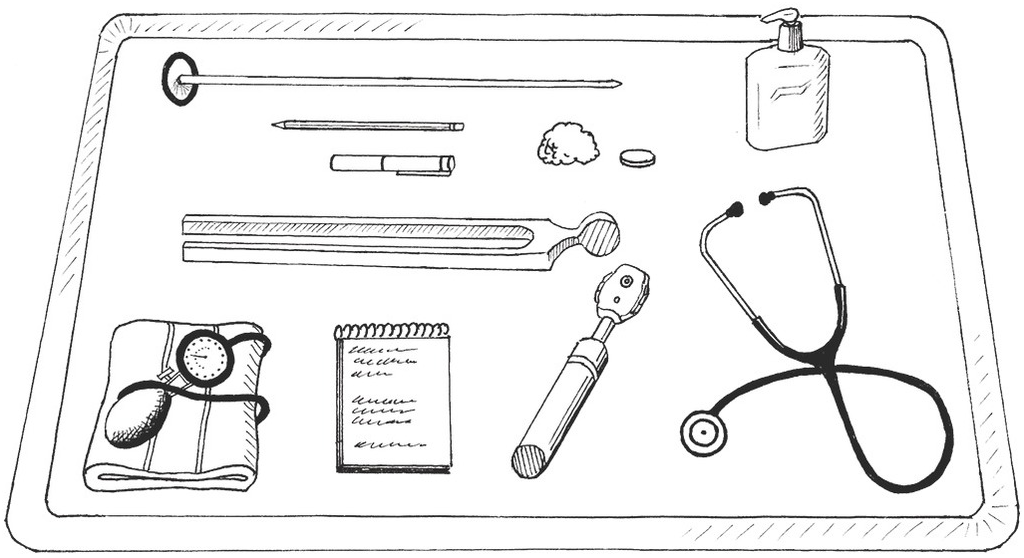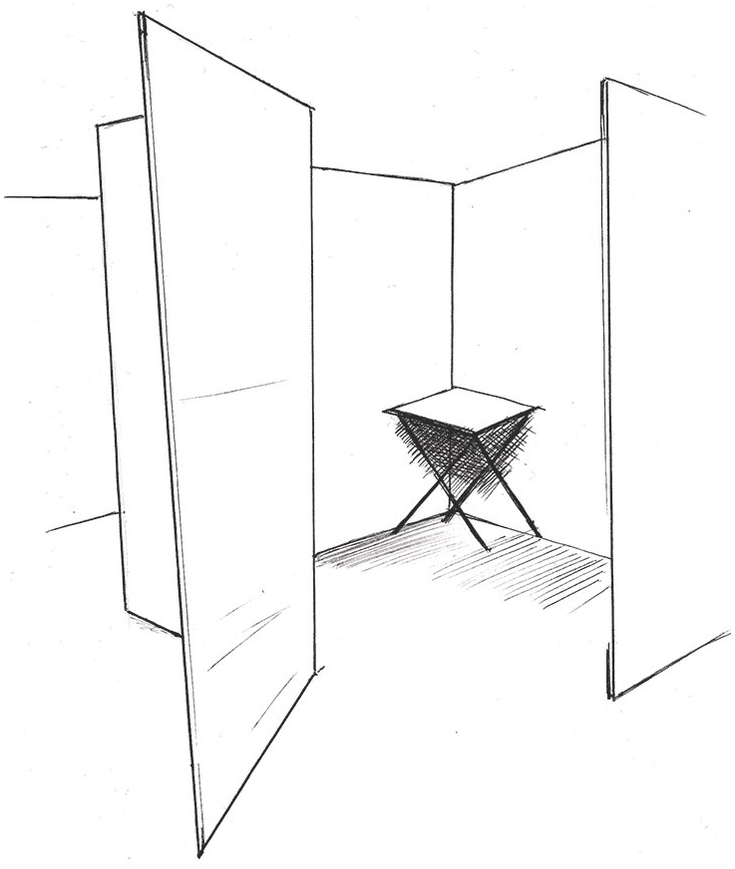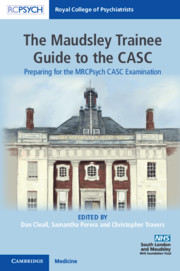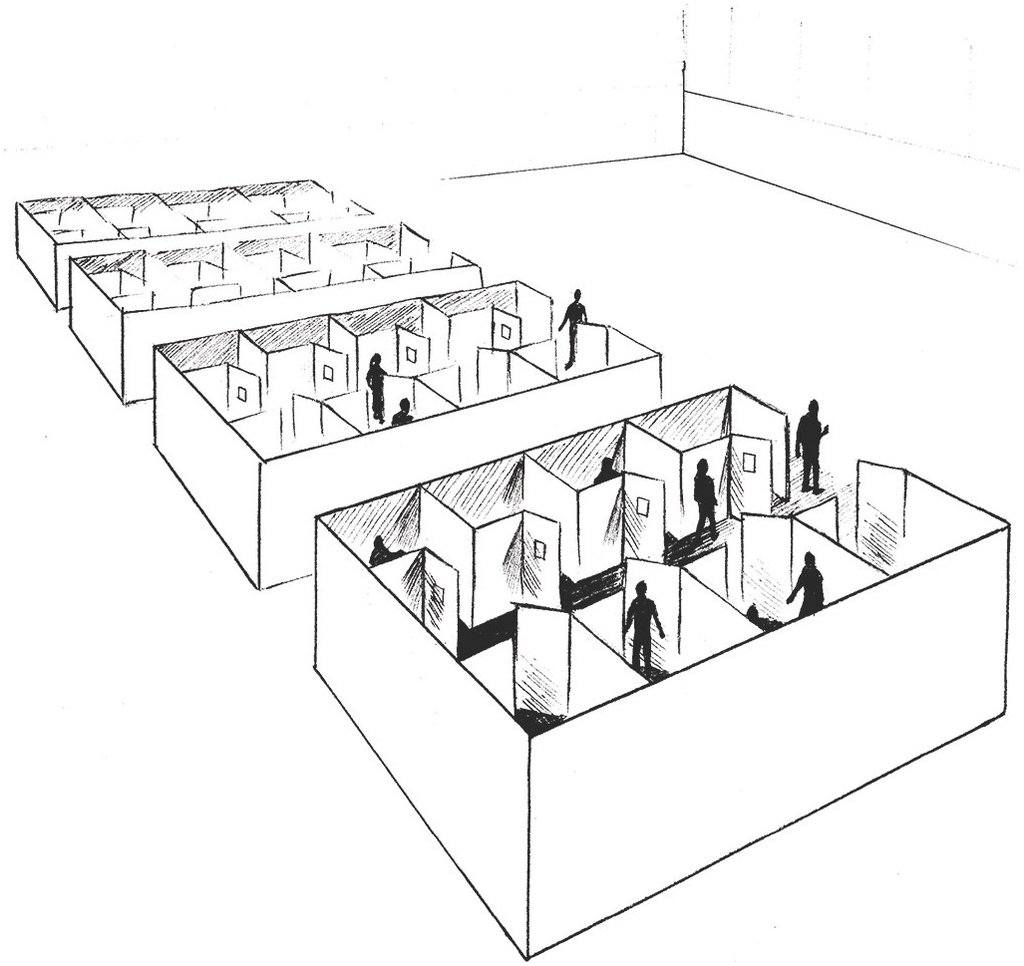This chapter aims to provide a brief overview of the Clinical Assessment of Skills and Competencies (CASC) examination whilst also offering aspiring candidates practical tips and advice collated from psychiatry trainees who have recently sat the examination. This firsthand information is intended to answer common queries candidates have about the CASC and will be provided in a question-and-answer format. The information contained in this chapter has been cross-referenced with advice from the Royal College of Psychiatrists (RCPsych) website and is up to date at the time of publication. However, we recommend that candidates review the RCPsych website periodically in order to keep abreast of any future changes.
The Examination
The Clinical Assessment of Skills and Competencies is the clinical component of the MRCPsych examinations. As it says on the tin, it is designed to assess a candidate’s clinical skills to ensure competency at a set point through his or her psychiatric training.
Eligibility
In order to sit the CASC, a doctor must have
1. a minimum of 24 months’ whole-time equivalent experience in psychiatry following foundation training (or internship);
2. passed MRCPsych Papers A and B (or comply with transitional arrangements*); and
3. sponsorship† in place and be able to demonstrate either
a. a completed Annual Review of Competence Progression (ARCP) at the time of application (if within an approved training programme) or
b. a completed Assessment Portfolio at the time of application with competencies equivalent to the ARCP (if not within an approved training programme).
* This refers to candidates who hold passes in Papers 1, 2, or 3, which were discontinued in 2015 following the introduction of Papers A and B. See the RCPsych website for further details.
† Sponsorship refers to an appropriate medical education lead who can confirm that the candidate has met the eligibility requirements in order to sit the MRCPsych examinations. See the RCPsych website for a list of authorised sponsors.
Format
The format of the CASC is similar to that of the Objective Structured Clinical Examination (OSCE), which candidates who completed their undergraduate medical training in the UK should be familiar with. In summary, the CASC is a scenario-based examination whereby candidates move between set numbers of stations, each involving a different task. The stations are designed to assess a range of different clinical skills across the breadth of psychiatric subspecialties. Prior to entering each station, the candidate will be provided with instructions. The candidate will then be expected to interact with an actor who is simulating a patient, professional, or relative. An examiner is present within each scenario to assess the candidate’s performance.
The CASC is divided into two separate circuits, which take place in the morning and afternoon of the examination day. Each circuit contains eight individual stations that last seven minutes. In the morning circuit, candidates will have four minutes to read the candidate instructions prior to completing each of the seven-minute stations. In the afternoon circuit, candidates will have 90 seconds to read the instructions. A bell will be sounded to indicate the start of each station. The candidates will hear a second bell at six minutes to indicate they have one minute remaining in the station. They will hear a third bell at seven minutes, marking the end of the station.
The 16 total stations are divided as follows:
Five stations involving history taking (including risk assessment)
Five stations involving examination (including physical, mental state, and capacity assessment)
Six stations involving patient management
The morning circuit will include all six of the patient management stations along with one history-taking station and one examination station. The afternoon circuit is formed of four history-taking stations and four examination stations.
Candidate Instructions
Outside each station will be the written instructions for the candidate. The instructions will provide information to ‘set the scene’ of the station scenario, followed by the explicit task for the candidate to complete printed in bold font. The length of the candidate instructions will vary; however, stations with four-minute reading times are likely to include more written information than those with 90 seconds. Within each station, an additional laminated copy of the candidate instructions will be attached to the candidate’s chair.
Actors
The actors used in the CASC are professionals who have received thorough training in their specified roles. Their instructions provide background information about their character as well as information directing them how to respond to a candidate’s questions and manner. For example, a candidate who rudely interrupts an actor may provoke irritability or anger. Similarly, if a candidate does not show empathy or is unable to build sufficient rapport, the actor may be less inclined to disclose sensitive information of importance to the station. Learning disability stations have previously used actors with a learning disability; therefore, candidates are advised to be prepared for this possibility.
Examiners
Examiners must have held a consultant post (or equivalent) in psychiatry for a minimum of three years and must attend regular training for the CASC examination. The examiner will be sitting within the station alongside the actor; however, the station will be laid out in a manner that should make it easy to distinguish between the two.
The examiner will remain silent throughout the station and will have been instructed not to interact with the candidate or to give any indication of the candidate’s performance.
Frequently Asked Questions
Where Does the CASC Take Place?
The CASC examination is held in the UK, Hong Kong, and Singapore. The UK CASC is held at the English Institute of Sport in Sheffield. The examination itself takes place in a large sports hall within the venue that is divided into separate circuits.
When Does the CASC Take Place?
The UK CASC takes place twice a year, in January and September. The Hong Kong and Singapore CASCs take place once yearly in October and May, respectively. The dates of the application periods and examinations are advertised on the RCPsych website.
What Should I Wear?
There isn’t a strict dress code for the CASC; however, candidates are advised to dress professionally. Many male candidates choose to wear suits, although successful candidates have chosen to wear a smart shirt with suit trousers or even a smart jumper. Similarly, some female candidates choose to wear formal attire such as a shift dress with blazer or a trouser suit, whilst others have worn a smart top with skirt/trousers. The most important thing is to wear something you feel comfortable in. For example, if you do not routinely wear a tight collar and tie, you may find this particularly stifling in the high-pressure environment of an exam. Although we recommend dressing comfortably, we do advise avoiding casual attire such as jeans, T-shirts, and trainers.
In the UK, it is common practice to be bare below the elbow due to infection control measures. These rules, however, do not apply in the CASC examination; therefore, sleeves are not required to be rolled up. Equally, ties, analogue wristwatches, bracelets, and rings are permitted.
What Do I Need to Bring on Exam Day?
You must bring valid photo identification with you on the day of the examination. The only acceptable forms of this are a passport or driving licence. Photocopies of identification are not permitted.
You must also bring a passport-sized photo of yourself, which you will be directed to give to the examination invigilators during registration.
We advise you to bring a copy of your admission form, which will have been emailed to you after you have successfully applied for the examination. The admission form contains your examination number and details of your allocated sessions and circuit.
Lunch is not provided; therefore, we recommend that you bring a packed lunch or enough money to pay for food and drink on exam day.
What Can I Bring into the Exam?
The only item that you may require in the examination, and are expected to provide yourself, is a timing device. Timing devices may include analogue wristwatches or fob watches. Digital watches are not permitted. If you forget to bring a timing device, or if it is defective, the invigilators will be unable to provide a replacement.
You will be provided with a notebook and pencil before you enter the examination and are not expected to bring your own. There will also be water available before, during, and after the exam.
Any station that requires examination equipment will be supplied with a generic clinical tray (see Figure 1.1). All equipment that you may require for a specific station (e.g. stethoscope, alcohol gel, tendon hammer) will be provided within the clinical tray. If you feel that a specific piece of equipment is missing or defective, you must alert the examiner immediately.

Figure 1.1 Example of the equipment tray
Mobile phones and other electronic devices are strictly forbidden within the examination hall. Any such devices must be turned off, stored in bags, and left in the candidate registration room with your other possessions. Any candidate found using a phone or an electronic device during the examination will be disqualified.
Are There Rest Stations?
There are no rest stations. The examination is separated into morning and afternoon sessions. You will complete one circuit per session, and each circuit contains eight back-to-back stations.
What Should I Do for Lunch?
There is a long break for lunch between the morning and afternoon sessions (approximately two and a half hours). Candidates may choose how they wish to use this time. Some candidates remain at the venue and utilise the café at the front of the building. However, others choose to stretch their legs and explore the surrounding area. There are a range of establishments from which to buy lunch within walking distance from the institute.
If you find talking about the ins and outs of an examination stressful, it may be preferable to spend the lunch break on your own. Conversely, if you enjoy reviewing your performance and comparing notes, there will doubtless be like-minded individuals to share the time with.
The lunch break can also be used to review revision notes; however, we recommend using the time to relax and clear your mind in preparation for the afternoon session.
What’s It Like in the Examination Hall?
The examination hall is surprisingly large. As you enter, you will be led to your designated circuit and starting station. Each circuit is set out in two rows of four stations, and each station is within a small open-top cubicle (see Figures 1.2 and 1.3). You will move clockwise around your circuit until you have completed all eight stations.

Figure 1.2 Exam hall layout

Figure 1.3 Individual station
It feels eerily quiet when you enter the hall. However, once the exam starts, the hall will come alive with the sound of dozens of candidates and actors. The background noise is noticeable, but manageable, and it shouldn’t distract you from your station. If you have difficulty hearing the actor in your station, it would be entirely reasonable to politely ask the actor to raise his or her voice.
The examination hall can be surprisingly cold, so candidates who are particularly sensitive to cold temperatures may wish to wear additional layers.
Where Should I Stay?
It is important to feel as relaxed as possible on the morning of the CASC; therefore, unless you live within the local area, we advise you to organise accommodations in Sheffield for the night before the examination.
There are two affordable hotels within a short walking distance from the English Institute of Sport. Many candidates choose to stay at these hotels; we therefore recommend booking in advance to secure a room.
Some hotels allow guests to pay for a late checkout. This service would give candidates the opportunity to return to their room during the extended lunch break.
How Do I Get There?
Sheffield is a large city and has good transport links. There are four international airports within an hour’s drive from the city:
Manchester Airport
Robin Hood Doncaster Sheffield Airport
Leeds Bradford Airport
Nottingham East Midlands Airport
Direct trains run from London St Pancras Station to Sheffield every 30 minutes throughout the day. The journey takes just over two hours by East Midlands Railway. There are also direct trains from Manchester that run on an hourly basis. If you choose to travel by train, we advise booking a ticket immediately after successfully applying for the examination. This enables you to take advantage of the advance ticket prices, which are considerably cheaper than booking near the date of the examination.
If you choose to drive to Sheffield, be prepared to pay for parking as there are limited free spaces available in the area around the English Institute of Sport.
How Is the Day Structured?
When you arrive at the English Institute of Sport on the morning of the examination, you will be directed to the candidate registration room. You must attend registration at the time indicated on your admission form, as the exam may start earlier than advertised. During the registration process, you will receive a badge with your examination number and a letter indicating your circuit and starting station.
Following the registration process, candidates will be grouped into their respective circuits. You will then be led into the examination hall to your individual starting station of the morning session. The morning session lasts approximately one and a half hours, after which you will have an extended lunch break. You will be able to return to the registration room to collect any possessions during the lunch break.
You must return to the registration room at the time indicated on your admission form in preparation for the afternoon session. The afternoon session is slightly shorter than the morning session due to less reading time for each station. Upon completion of the afternoon session, you are free to leave the examination hall to celebrate finishing the CASC!
How Much Does the CASC Cost?
The CASC exam is expensive. Pre-Membership Psychiatric Trainees and affiliates of the RCPsych are entitled to a discount; however, even with the discount, the fees for the 2019 UK examination were approaching £1,000. This increases to nearly £1,500 for the Hong Kong and Singapore exams.
UK candidates are advised that they are entitled to claim tax back against the cost of professional examinations, including the CASC.
Are There Video Demonstrations of CASC Stations?
The RCPsych website includes several videos of sample CASC scenarios that are designed to help candidates familiarise themselves with the examination.
Will I Be Expected to Use Alcohol Gel in Physical Examination Stations?
Yes. Candidates are expected to cleanse their hands with alcohol gel before and after performing a physical examination. Alcohol gel will be available in all stations requiring a physical examination and should be clearly visible when entering the station. You will not automatically fail the station if you forget to use the alcohol gel; however, you will receive a lower mark for the examination.
How Is the CASC Marked?
The examiner within each station will produce two sets of scores for each candidate:
The first set of scores reflects the candidate’s performance on domains specific to the station (e.g. applied clinical knowledge, communication skills, clinical management skills). Between three and five domains are assessed per station, and each domain is scored from one (poor) to five (excellent).
The second set of scores is a six-point overall global judgment for the station: Excellent Pass, Pass, Borderline Pass, Borderline Fail, Fail, or Severe Fail.
The Borderline Regression Method (BRM), which is deemed to be the most impartial means of setting the standard for clinical-based examinations, is used to set the overall pass mark for each station. In order to pass the whole exam, a candidate is required to meet or exceed the total borderline regression score and pass a minimum of 12 out of the 16 stations.
If candidates receive a ‘Severe Fail’ in two or more stations, their performance will be reviewed by the Examinations Sub Committee (ESC) and they may fail the exam, irrespective of their total test score or whether they have passed 12 or more stations.
Examples of the mark sheets used by the examiners, a detailed explanation of the Borderline Regression Method, a breakdown of the criteria for assessment, and grade descriptions can be found on the RCPsych website.
When Are the CASC Results Published?
Exam results will be sent to candidates on a predetermined date that will be available from the RCPsych website. The names of successful candidates will also be published on the RCPsych website by 17:00 on the results day. Candidates who do not want their name to be published on the website will have the opportunity to indicate this on their initial exam application.
Will I Receive Feedback after the Exam?
Candidates who pass the CASC will receive their overall mark including the number of stations they passed and failed. However, they will not receive further qualitative feedback.
Unsuccessful candidates will receive a limited amount of qualitative feedback indicating the areas in which they performed poorly.
I Require Alternative Arrangements to Sit the CASC – How Do I Organise This?
Some candidates may require extra time, their own private room, or other alternative arrangements to help them sit the CASC. If you believe you will need alternative arrangements, please contact the RCPsych exams office prior to applying for the CASC to ensure there is adequate time for this to take place. You may be required to provide evidence as to why you require alternative arrangements.




